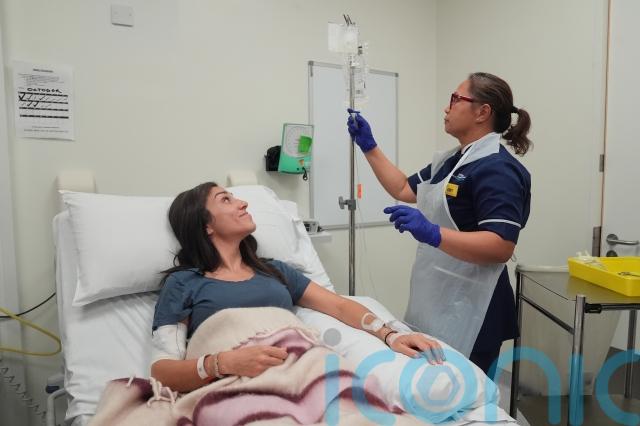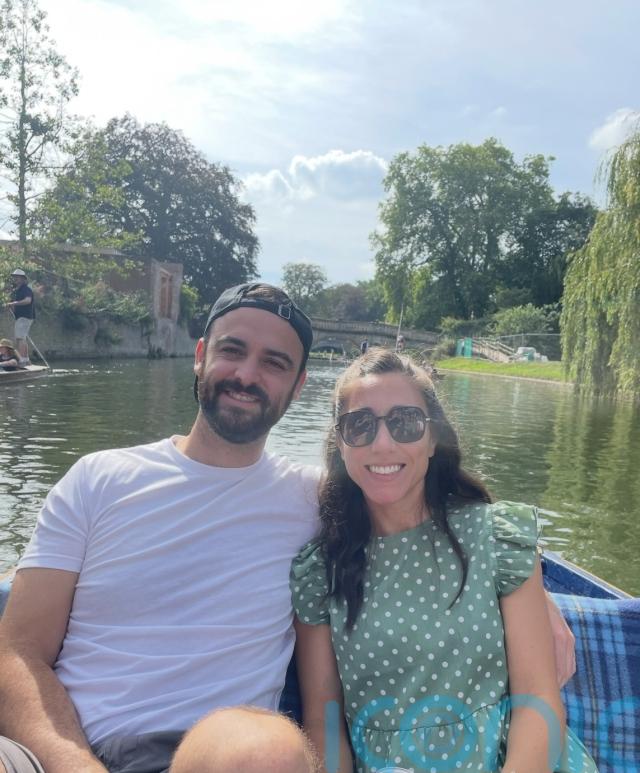
A biology teacher has become the first patient in the UK to receive a “gamechanger” therapy to treat multiple sclerosis (MS).
The CAR T-cell treatment, which experts believe could “transform” lives by halting or slowing down progression of the disease, is custom-built for each patient in the lab.
The person’s own T cells, which are crucial for hunting out infected or damaged cells, are genetically engineered by scientists and fed back into the patient via an infusion to “re-set” the immune system.
CAR T for MS modifies the T cells to recognise and kill B cells, which are known to cause damage and allow MS to advance.
Emily Henders, 37, from Bushey, Hertfordshire, received her CAR T last week at University College London Hospital (UCLH) as part of a global clinical trial into whether it can treat MS.
The mother-of-two, who has sons aged six and four and is married to Brandon, told the PA news agency she was feeling well after receiving the infusion in a three-minute procedure.
“I’m actually feeling really good,” she said. “I’m feeling normal and I’ve got energy back.
“I don’t have any nausea, I’ve had no fevers. I’m feeling pretty relaxed.”
Mrs Henders was diagnosed with MS in December 2021 after suffering tingling in her hands. Her father has the condition and she was aware what the symptoms could indicate.
“It has always been in the back of my mind I guess because I knew that there was a genetic or a hereditary component to it,” she said, “but it still came as a shock and was quite a hard pill to swallow.
“I was diagnosed on Christmas Eve as well – it probably wasn’t the best day to go and get that diagnosis.”
Since being told she has MS, Mrs Henders has suffered four debilitating relapses, despite taking one of the most highly effective medications for the disease.
“Physically, my symptoms have progressively got worse,” she said.
“I notice sometimes my foot hits the pavement in a funny way. No-one else would notice it, but I feel it.
“Or when I’m teaching and I’m doing a science experiment, I can feel my hands are shaking, and I’m very much aware that probably the students can see that my hands are shaking.
“When I’m having a relapse, not being able to move my legs means I can’t get around the house, I can’t help with the kids, I can’t drive, and then that puts an impact on everybody around me as well.”

Mrs Henders will “never forget” her first major relapse when an ambulance had to be called and her children had to see her wheeled away.
“I was just getting out of bed and my oldest son was was there with me, and I couldn’t stand up, and it was very scary,” she said.
“The ambulance came, and and I’ll never forget my children’s faces as the medics were rushing in and then strapping me to a chair and carrying me down the stairs and putting me in the back of an ambulance…
“Emotionally, I worry for them and how they’re dealing with it, and how they’re taking it.
“I worry that this might be passed on to them. It’s very scary for the future, just not knowing what it’s going to bring or what the next relapse would bring.
“MS has also impacted us in terms of growing our family.
“I would have loved to have had a third child, and the main reason we haven’t is because I would have to be off medication, and we’ve had to weigh up the risk of that versus having another child.
“We’ve got two very healthy, beautiful boys and we’ve had to think: is it worth the risk to have another one?
“That’s been really hard to accept, because I would really love a third.”
Mrs Henders said a good outcome of CAR T-cell therapy for her would be to “never experience a relapse again”, though “obviously the ideal would be a cure.”
She added: “When I have my relapse, my legs don’t work, I can’t walk.
“It’s obviously really scary. Amazingly, every time I have had a relapse, I do get that sensation back, but that fear is always there.
“So to never wake up and experience that would be fantastic.
“MS can have a really like gradual and slow decline, and the probability of ending up in a wheelchair with MS is high.
“Hopefully this treatment will avoid that.
“It would mean I’ll be able to chase my children around, and I’ll still be able to work.
“I’m a science teacher, and I wouldn’t be able to be a science teacher in a wheelchair or even on crutches.
“It’s too much of a health and safety hazard, so that would have a real impact on my job as well.”
According to UCLH consultant haematologist, Claire Roddie, CAR T-cell offers real hope for MS patients and has shown success in cancer and the autoimmune disease lupus.
“Our ultimate goal is to achieve long periods of disease remission with a single, one-time CAR T-cell treatment,” she said, adding it could mean people can come off all their other drugs.
“We are excited about this because we’re taking a treatment developed to treat cancers and re-purposing it for a whole new spectrum of conditions.
“CAR T-cells also go to places in the body that other drugs don’t necessarily get to very effectively.
“If you’ve got multiple sclerosis, and the cells that are driving that multiple sclerosis are sitting somewhere in your nervous system or around your nerves, it’s quite difficult for regular drugs to get there, to deplete them.

“So CAR T-cell offer a really, sort of tangible potential solution here.
“The concept here is that we give this CAR T-cell therapy, this ‘one and done’ – bang, you’re in, you get the treatment, and that’s it.
“And hopefully you don’t need any more drugs beyond that time point.
“If we could achieve that in MS, it would transform so many people’s lives.”
Caitlin Astbury, senior research communications manager at the MS Society, said: “As the UK’s leading charity for people affected by MS, we’ve been following developments in CAR T-cell therapy with interest.
“It’s amazing to see this new avenue of treatment being explored.
“There are over 150,000 people living with MS in the UK, but existing treatments don’t work for everyone.
“It’s early days but, if trial results prove successful, CAR T-cell therapy could be a gamechanger for how we treat the condition.”
Dr Wallace Brownlee, consultant neurologist and clinical lead for the multiple sclerosis service at the National Hospital for Neurology and Neurosurgery, as well as principal investigator on the trial, told the PA news agency that current MS treatments require ongoing tablets or injections or trips to hospital.
He said the “real promise” of CAR T-cell therapy is that it can be given just as a single treatment, potentially freeing people from a future of needing to take immunosuppressants.
Dr Brownlee added: “CAR T-cell therapy is an exciting new frontier in the treatment of autoimmune conditions.”
The trial aims to recruit up to 18 patients globally by early 2027.
Subscribe or register today to discover more from DonegalLive.ie
Buy the e-paper of the Donegal Democrat, Donegal People's Press, Donegal Post and Inish Times here for instant access to Donegal's premier news titles.
Keep up with the latest news from Donegal with our daily newsletter featuring the most important stories of the day delivered to your inbox every evening at 5pm.